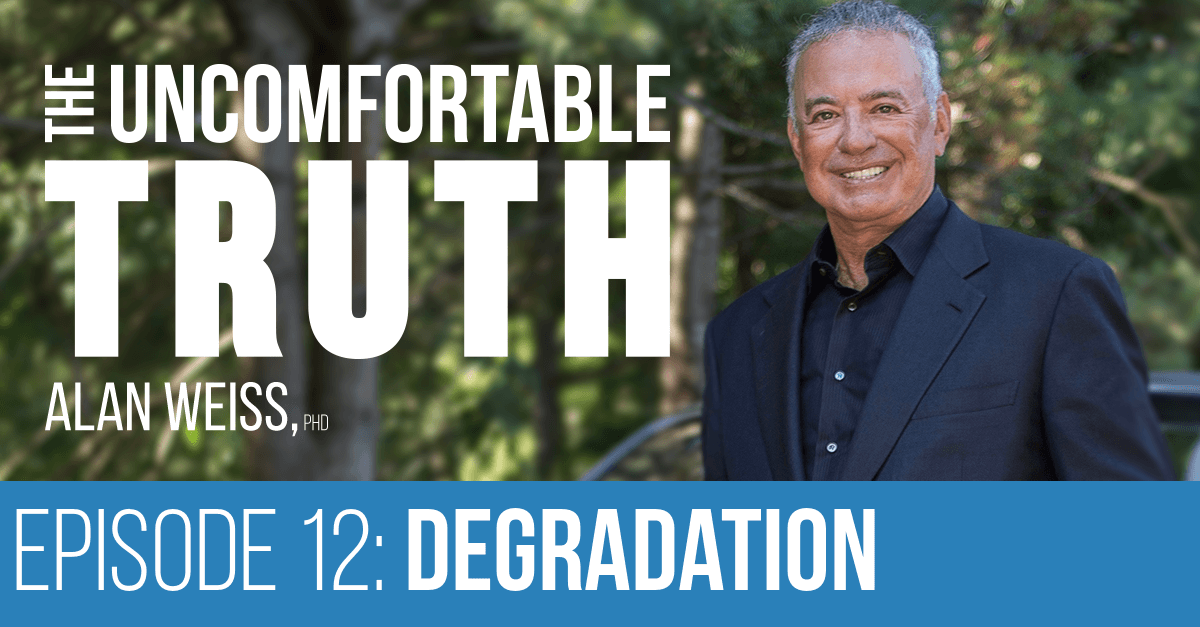
Episode 12: Degradation
“How standards begin to erode and what we can do to correct it.”
Transcript:
Welcome to The Uncomfortable Truth, I’m Alan Weiss, and my topic today is degradation. Degradation, to degrade – that means to wear down, to erode. This isn’t about “the good ol’ days.” I’m not about to tell you that things were always better back when – but some things were better. Some things were more civilized.
When I first started flying, Pan Am was still in business and had the “Clipper Club,” it was by invitation only. So, if you were a frequent enough flyer, you didn’t get points, but Pan Am invited you to membership in this club, and it was in select airports. And it was, in those days, a great place to relax. All the food and drinks were free, and they were in great quantity – fine food and premium liquor. You could only get in if you were a member, and you were only a member if Pan Am invited you. If you showed up without a jacket, (most people traveled with jackets and ties, I didn’t) they gave you a jacket. They had Pan Am, sky blue jackets in different sizes, and you put one on while you were in the club.
The club had hosts, and they were very nice. Now, some years after that, of course, there was a lawsuit filed and said that airlines could not have these private clubs. Anyone could join if there were fair criteria, and the criteria included paying a certain amount. And now, I recall sitting in the United Club in Denver awhile ago, and at the United Club, I watched a man come in, in shorts and flip flops, and put his feet up on a table, and take out a nail clipper and cut his toe nails right on that table in the United Club. Now, if that’s progress folks, you and I have different ideas about progress.
So, some things were better, and some things were more civilized, and you’ve all seen this. We’ve all seen some of the horrors that happen when you invite just anyone, and allow just anyone to do certain things.
Language, once upon a time, had much more nuance. For example, the phrase, “my bad.” Now, “my bad,” I would guess, is meant to say it was my mistake, but it also sounds highly sarcastic to me. “Okay, my bad.” In other words, you’re complaining about something, I’ll take the hit for it, but for goodness’ sake, it’s not really worth complaining about, is it? You know, “my bad.”
“No worries.” Does that mean you’re welcome?
- “Hey thanks for that.”
- “No worries.”
What does it mean? “I don’t really care.”
- “Thanks very much.”
- “Who cares?”
You know, big deal, why’d you bother me to begin with?
And then there are horrible, horrible, exceptions to grammar rules – breaking of the rules. Between you and I, has the tint of modern usage to it as though it’s a special high class way of saying it’s between you and me, which is correct. Modern usage, so to speak, is horrible.
Now, to get away from using male and female pronouns, because we have pronoun police, it’s suggested that “they,” a plural, become a singular, so you don’t have to say he or she. It gets weirder and weirder.
There was a time when first names weren’t the default. It’s interesting, somebody will call me a rightly and say, “Alan, I was reading one of your books.” I don’t know this person. Now, it doesn’t kill me that they call me Alan, but it might be nice if they said Mr. Weiss, or Dr. Weiss, or Your Eminence, something like that. I usually say Mr. Or Ms. when I first meet someone, and certainly Dr., but we have this assumed familiarity today. Even people who want a favor from me, are this careless. A fundraiser will call, a paid fundraiser no less, and say, “Alan, I’m calling on behalf of the Association of Associations, raising some money.”, and I immediately say, “Do I know you?”
You know, civility has certain parameters, and when you break those parameters, when you go outside them, there are some adverse affects. There is no privacy today. No one has a proper expectation, or a sane expectation, that what they say or do won’t be broadcast. Privacy is being violated every day, and the consequences for violating privacy are very slim today.
We have ferocious emails because of the internet and because of emails, people say things that they would never say in person. If you look at what people send without second thought in emails, it’s frightening. If you look at what some people put on Facebook, it’s frightening. If you use vehicles, like say Periscope, where people can comment, anyone can comment as you’re broadcasting. You get some of the great perverts in the universe on there, who have nothing better to do than assume false identities, and say ugly, vicious, obscene things. That’s not great.
I remember Avenue Q, which I saw twice, a great play on Broadway, which featured, I quote, “full frontal puppet nudity.” There’s a song in there (it’s a musical) and the song is The Internet Was Made For Porn, and it’s got more than a germ of truth to it, doesn’t it? Whereas bullying was once restricted to people you might meet in the school hallways, or even at the water cooler at work, today bullying is virtual, and people gang up on very vulnerable others and take advantage of them in ways we never thought possible before.
Plagiarism and theft today, are no longer looked down on as much as we used to. There are online sites, where some pond scum uploads books, and other pond scum makes them available to third party pond scum, who want to download them for free. Everybody knows this is illegal, but they all think they’re in on some racket.
Somebody said to me once, “Don’t you worry about the business you’re losing, the revenue you’re losing?” Well it’s not that many books, and I don’t make my living selling books, and who wants those people as customers? But it’s a lack of civility and it’s lack of observance of the laws, and it’s tolerated, and people think it’s kind of sharper today, when emails are hacked and sites are hacked, and people’s identities are stolen, and so forth and so on.
There was a time when music was not used to denigrate women, was not used to promote violence. Paul Anka had a song, that later called outrage, it was called Having My Baby. Now, is that song really so bad compared to some rap artist, and I use artist in quotes here, calling women bitches and worse? Paul Anka seems rather mild in comparison. And nor did music glorify crime.
Now you might say that this is just society evolving onward, or you might say “what the hell is going on here?” Not every grievance, once upon a time, was deemed cosmic. Not every grievance was considered to be worthy of a UN resolution to ban whatever was causing the grieving. Victimization was not an art form. People didn’t grow up seeking to be victims. People didn’t focus on trying to be a victim, but rather, on trying to escape being a victim.
We didn’t demand for everyone change their lives to accommodate one other person’s. We were in a position, where some assistant working in a medical office demanded of patients who were paying to be there, that they couldn’t wear fragrances because she was allergic to them. Then she should get another job not in the public domain. Of course, you have to wonder what she did on subways or buses or elevators or any other kind of assembly of people where you cannot prohibit fragrances, but there you have it. It was her grievance.
Students were expected to debate issues, not be protected from them. That was the subject of my last podcast. You graduated in four years, not six, having done the required work. You couldn’t major in things like the study of comfort vs. discomfort in my dorm.
We’ve declined in other ways too, that aren’t just a degradation, but are a shame. For example, in those days there was no crushing student debt. There was student debt, and sometimes it was a little tough to pay off, but in more modern times, the debt is absurd. How can you send someone out into the world with six figures of debt, and expect them to start a family and make a living, and also repay that kind of obscenity? That needs to be changed.
We have paralyzing regulations today on small business, and while some might be eased soon…who knows? The amount of regulation it takes in any state to start a business, to run it daily, to report revenues, to comply with regulations, to observe environmental rules, to observe safety rules, and everything else, it’s not that these things aren’t important, but the bureaucracy attendant to them, is frightening. We need to enable businesses to thrive, not to struggle. It’s hard enough to make a living.
We have an increasingly, shielded virtual world. A world where we can hide. A world where we can say things and not have to say them face to face. A world of too much amenity. Just the other day I got a letter that said “I know you’re a major donor to this particular cause, but here is what the executive director is doing, and it’s unfortunate, and it’s not right, and I wanted you to know.” But there was no name. It just sounded like somebody else with a grievance. Somebody else who feels perhaps they should have been in that position. I’m not interested in amenity. It’s cowardly, and most of the things that go on anonymously, over the internet, are cowardly.
We’re also in an age where we feel we can make a quick buck irrespective of whether we’re contributing value. I don’t know if you call it multilevel marketing, or anything else, network marketing, it’s a ponzi scheme. There’s no value contributed to the environment. People are paid to bring other people on board who are paid to bring other people on board, and only the people who started this thing make a lot of money, and the money is not based on anything other than people paying money to try to make money themselves. That’s not marketing. That’s cheating, and ponzi schemes are illegal, ask Bernie Madoff.
We’re not Rome, you know, this is not a civilization in decline, because advances today abound. We have great advances in safety. Airline safety in this country is as good as it’s been since we started recording it. We have made tremendous advances in health, perhaps not in controlling health costs, but in helping people to lead higher quality lives and longer lives. We’ve made great advances in travel, with people traveling all over the world to learn more, and to understand what the world is about, and to see more things. It’s safer to travel. There are more places to which you can travel. Standard of living has increased for everyone, even the poor. Communications have increased. Recreation opportunities have increased.
Ironically one of the only things that hasn’t increased, and has probably decreased, is the willingness of large companies to be responsive to customer needs. Just try calling one of their helplines. You’ll get somebody somewhere, in India, or Pakistan, or Bangladesh, or the Philippines, who doesn’t speak English very well, wearing an American baseball cap, as though that makes them Americans, whose job is not to help you.
But, you know, at one time, we could cross the Atlantic in three hours. That was the Concord, and you got across the Atlantic in three hours. Today, it still takes five and a half to six and a half, depending upon the direction and the winds. Haven’t made much progress there. In 1890, and this is true, by the way, everything I tell you is true, in 1890 a steam locomotive traveling from New York City to upstate New York, Rochester or Syracuse, was faster than the train service today.
So, as we find good things, why can’t we hold onto them and make more of the good things? Why do we have to get into this degradation, where we become too forgiving, too complacent, too compliant. There’s not enough challenge, and that’s the problem of being on top.
I’ll end by quoting Morris West, he wrote The Shoes of the Fisherman and The Devil’s Advocate, but he also wrote a book called The Navigator, and he says, “The problem with the high place is that you don’t know if the voice you hear is the voice of God, or only the echo of your own mad shouting.”
I’m Alan Weiss, I’ll see you next time.






